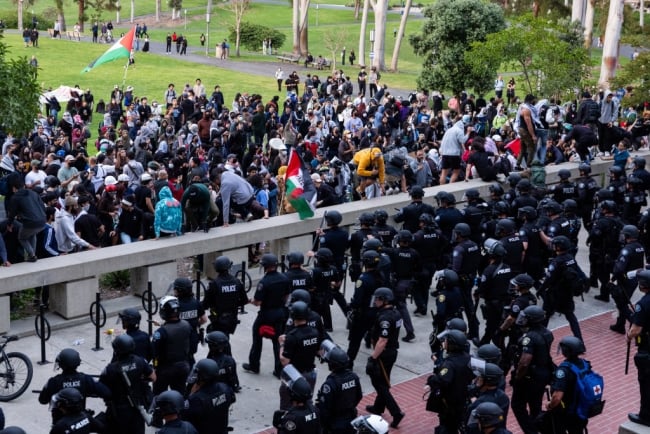You have /5 articles left.
Sign up for a free account or log in.

Police officers clear an encampment set up by pro-Palestinian demonstrators at the University of California, Irvine, on May 15, 2024.
Qian Weizhong/Visual China Group (VCG)/Getty Images
America’s colleges and universities have just endured one of the sternest tests ever of their commitments to protect student safety and freedom of expression. Protests over the Israel-Hamas war that erupted this spring from coast to coast posed tough and sometimes agonizing questions for campus leaders.
Should they take down those tents on the quad right away or let the encampments stand for a while? Should they negotiate a resolution or crack down on those who broke the rules and created unacceptable disruptions for the campus community? How and when should they seek police intervention, and what should they do to prevent the use of excessive force against students, faculty and others at the scene?
More challenges: How to deal with masked protesters who might or might not be members of their community? How to stand against antisemitism and anti-Arab discrimination while preserving space for robust political debate?
Many in Congress and elsewhere are eager to second-guess the choices these leaders made. That is their right, even if the critiques sometimes feel like cheap shots.
Many Jewish students have experienced outrageous abuse and intimidation. Likewise, there are pro-Palestinian demonstrators who have encountered intense hostility and bullying. But it is notable that so far, thank goodness, there have been relatively few incidents of violence, and graduation ceremonies remained largely peaceful despite ongoing tensions.
Now is the time to review lessons learned from this extraordinary season of upheaval. The next academic year is fast approaching and, with it, the likelihood of more volatile protests in the closing months of a divisive presidential election campaign.
As president of the American Council on Education, which represents all sectors of higher education, I speak often with college presidents who anguish over the protests and the aftermath. They know it is their job to make difficult choices. None of them relish the role of enforcer. All want their students to be safe and their communities to be known as sanctuaries of learning and dialogue.
There is no single best practices playbook for dealing with campus protests. The response to any situation depends on a host of variables. For example, a college in a large city with a relatively open campus would respond differently than a small college in a rural area. Public universities are bound to uphold First Amendment rights of free speech and assembly. Private universities value these freedoms, too, but do not face the same legal constraints.
Still, here are core principles that apply in all cases.
First, all students deserve our protection, and they deserve every chance to learn. Their safety is paramount. So, too, is their ability to speak out, to argue with peers and professors, to challenge their institutions, society and government. No matter how tense the moment, college presidents must not fear their students. They must embrace the educational possibilities inherent in confrontation and debate.
Second, faculty deserve our protection, too. They are our greatest resource in the quest to learn from the profoundly tragic war in the Middle East and unsettling events in the United States. We must be steadfast in supporting faculty who advise and teach our students— even, and perhaps especially, during protests. We must acknowledge that faculty, like students, are entitled to speak out on issues of war and peace. But faculty also bear significant responsibility to elevate the campus dialogue, bring historical and cultural context to the events, and find ways to engage as many students as possible, not just those who are protesting.
Third, rules and laws must be enforced. Campus leaders cannot allow protesters to infringe on rights of other students. Those who knowingly break the rules must be ready to accept the consequences. This is, of course, the most contentious arena in analyzing responses to protests. As I write this, colleges nationwide are reviewing student conduct rule books to ensure they are fair and up-to-date. They are also reviewing emergency protocols that involve local and state police and their reliance on private security. All that is necessary, but not sufficient, to meet the challenges ahead. The power of enforcement always comes with discretion and judgment.
My hope is that all the scenarios that have unfolded on campuses in recent weeks, including police sweeps and arrests that produced some disturbing images, are equipping college presidents with a deeper reservoir of knowledge about how they can exercise discretion and judgment the next time emergencies arise.
Lastly, campus leaders are always accountable for their responses to protests this spring and those that may yet occur. But the proper authorities for exercising accountability in these cases are the governing boards of each institution. We have seen a troubling trend in which elected officials, including members of Congress, seek to exert deeper influence in the management of colleges and universities. Congressional committees certainly have a legitimate role in oversight of federal funding for higher education. But they are not the proper forum for discussing student disciplinary cases, personnel investigations or the sanction and removal of college presidents.
Recently, one prominent lawmaker decried what she viewed as “mealymouthed, spineless college leaders.” I see it differently. I see presidents making hard calls in very hard situations. Presidents who are devoted to fighting antisemitism and other pernicious bigotry. Presidents who are learning as these protests evolve. Presidents with backbone.




